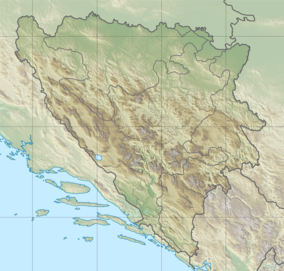This article needs additional citations for verification. (July 2020) |
Trebević (Serbian Cyrillic: Требевић) is a mountain in central Bosnia and Herzegovina, located in the territories of Republika Srpska, Sarajevo and East Sarajevo city, bordering Jahorina mountain. Trebević is 1,628 meters (5,341 ft) tall, making it the second shortest of the Sarajevo mountains.
| Trebević | |||||||||||||||
|---|---|---|---|---|---|---|---|---|---|---|---|---|---|---|---|
IUCN category V (protected landscape/seascape) | |||||||||||||||
 Trebević mountain view from Istočno Sarajevo | |||||||||||||||
| Location | |||||||||||||||
| Coordinates | 43°49′07″N 18°27′36″E / 43.81861°N 18.46000°E[1] | ||||||||||||||
| Area | 4.0 km2 (1.5 sq mi)[2] | ||||||||||||||
| Established | 2014 | ||||||||||||||
| |||||||||||||||
During the Middle Ages, Trebević was known as Zlatni Do.[citation needed] During the 1984 Winter Olympics Trebević, like the other Sarajevo mountains, was used for several Olympic events, such as bobsledding.
Trebević today is important as a tourist destination for citizens of Sarajevo as Igman or Bjelašnica.[citation needed] Most of the land mines are now cleared from heavy fighting that took place in the early 1990s. There are a few hotels, mountaineering homes, and other such structures on Trebević and the immediate area. The mountain is very popular for family picnics, hiking, climbing, mountain biking and it has a downhill track for local and international skiing competitions.[3]
Trebević has been the main excursion site for Sarajevo citizens due to the favorable geographical position, climate and the beauty of the nature. The biological diversity is among the highest and it is extraordinary to find such a phenomenon near the heart of the big city.[citation needed] On 9 April 2014, Sarajevo Canton Assembly declared Trebević a protected area, in order to conserve and improve each element of the geographical and biological diversity.[4]
Trebević can be reached from Sarajevo by the Trebević Cable Car, which starts from the neighbourhood of Bistrik.[citation needed]
Mineral and crystal deposits
editThe area is known to contain quartz, siderite, and calcite crystal deposits, and one such item is on display in Sarajevo at the National Museum of Bosnia and Herzegovina.[5]
History
edit1984 Winter Olympics
editOrthodox cross controversy
editIn March 2008, a Bosnian Serb organization Savez logoraša Republike Srpske (Association of Bosnian Serb War Prisoners), led by Branislav Dukić, announced its intention to erect a giant 26-meter (85 ft) high Orthodox Christian cross at the part of the mountain on Republika Srpska territory in order to commemorate the Serb victims in Sarajevo during the Bosnian War.[6] The idea followed a move by Bosnian Croats who erected a Catholic Christian cross on Hum Hill above Mostar, remembering Croats killed there during the Bosnian War.[7] High Representative for Bosnia and Herzegovina Miroslav Lajčák asked Republika Srpska authorities not to allow the construction of the cross.[8]
The structure was built in early 2014, only for it to be demolished within a month by persons unknown. There has recently[when?] been talk about its reconstruction; however, this has yet to materialise due to the fear of it being demolished once again.[9]
References
edit- ^ a b Trebević, Bosnia and Herzegovina Peak bagger
- ^ Trebevic Protected Planet
- ^ Ski resort Trebevic skiresort.info
- ^ "Zaštićeni pejzaž "Trebević"". Javna ustanova Zaštićena prirodna područja Kantona Sarajevo. Archived from the original on 31 March 2015. Retrieved 13 April 2015.
- ^ "Mineral and crystal deposits in Sarajevo Canton". mindat.org. 31 August 2015.
- ^ "Sarajevans angered by Serbian cross project". NBCnews. 12 March 2008. Retrieved 12 July 2016.
- ^ Bosnia Serbs To Erect Sarajevo Cross Archived 2013-10-07 at the Wayback Machine, Balkaninsight.com, 12 March 2008
- ^ Int'l administrator: Bosnian Serb authorities should not allow giant cross over Sarajevo, Associated Press/International Herald Tribune, 14 March 2008
- ^ "Savez logoraša plaši se da bi krst na Zlatištu mogao biti srušen, čekaju dozvolu". radiosarajevo.ba. 18 July 2018. Retrieved 14 July 2020.

